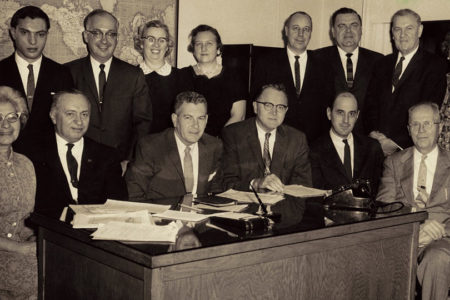Men Who Believed
Replacement Theology, which strips Israel of God’s promises, has been around a long time. But in every generation, there also have been men who believed, long before 1948, in Israel’s national restoration. Even though most of them were not fundamental as we understand the term, they shared one common factor: While reading their Bibles, they came to the inescapable conclusion that the church and Israel are not the same and that God would bring the Jewish people back to their own land.
Thomas Brightman (1562–1607) of England wrote detailed commentaries on Daniel and Revelation. In his book, Revelation of the Revelation, he asked the question, “What, shall they return to Jerusalem again?” His reply:
“There is nothing more certain; the prophets do everywhere confirm it and beat upon it.”
Charles Jerram (18th century) won a prize in 1795 for an essay arguing that the Jewish people would return to their Promised Land. His position was based on the Abrahamic Covenant. He wrote that the promise to “give…all the land of Canaan for an everlasting possession” (Gen.17:8) “is absolute and unlimited,” and the “title of the Jews to the land of Palestine inalienable.” At the time, he was considered one of the most powerful exponents of this view.
Rev. Samuel Bradshaw wrote A Tract for the Times, Being a Plea for the Jews in 1844. In it, he proposed that the British Parliament allocate 4 million pounds for the restoration of Israel, with another 1 million to be collected by the church.
Pastor T. Tully Crybace formed a committee in London in 1844 to found the British and Foreign Society for Promoting the Restoration of the Jewish Nation to Palestine. In his opening address he urged that England secure from Turkey all of Palestine “from the Euphrates to the Nile, and from the Mediterranean to the Desert,”—the entire territory God promised the patriarchs under the Abrahamic Covenant.
William Hechler (1845–1931) served as a chaplain at the British Embassy in Vienna. In 1882 he published a book titled The Restoration of the Jews to Palestine According to Prophecy. Later he worked closely with Theodor Herzl and, for more than 30 years, dedicated himself to the task of returning Palestine to the Jewish people.
Lewis Sperry Chafer (1871–1952) was the founder and first president of Dallas Theological Seminary and author of the eight-volume Systematic Theology. This was the first time a premillennial, dispensational framework of Christian theology had been systematized into a single format. It was finished in 1947 and published in March 1948. In it he said Israel’s reestablishment as a nation was yet to come. And so it did, in May 1948. He was not a prophet, merely a diligent student of God’s infallible Word.
Henry Finch (1558–1625) was a member of Parliament and a respected legal scholar in England. In 1621 he wrote The World’s Great Resurrection, also called The Calling of the Jewes [sic]. He taught that the Bible should be taken literally when referring to Israel’s return to its own land, the conquest of its enemies, and Israel’s rule of the nations. King James of England, who commissioned the King James Version of the Bible, was offended by Finch’s views. Consequently, Finch and his publisher were quickly arrested. Finch was stripped of his status and possessions and died a few years later.
This information and more can be obtained from The Thomas Ice Collection by end-times scholar Thomas Ice at RaptureReady.com. It is titled “Lovers of Zion: A History of Christian Zionism.” Also referenced here is Derek White’s article “Christian Zionism,” available at zionism-israel.com/christian_zionism/Christian_Zionism_history.html.







